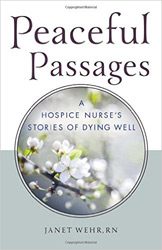 I started reading Peaceful Passages the day Governor Jerry Brown signed California’s Assisted Suicide bill into law. The context is important, at least it has been to me. I should start by saying that Peaceful Passages might be the best book I’ve written about as part of the Patheos Book Club. Janet Wehr, RN, has been a Hospice Care nurse for many years. That’s not an easy thing because you need both boundaries so the grief of it all doesn’t eat you alive, and you need to open your heart to be with people during astonishingly personal and vulnerable moments. In my experience, most individuals have the capacity to do one or the other, but not both over long periods of time. Janet Wehr has a lovely writing style and an even lovelier heart. The honor, care, and spiritual attention she gives to her patients is a gift. Many of the stories she tells about dying well, end as they do because she is who she is. Understand, I don’t know her; I get this from the book.
I started reading Peaceful Passages the day Governor Jerry Brown signed California’s Assisted Suicide bill into law. The context is important, at least it has been to me. I should start by saying that Peaceful Passages might be the best book I’ve written about as part of the Patheos Book Club. Janet Wehr, RN, has been a Hospice Care nurse for many years. That’s not an easy thing because you need both boundaries so the grief of it all doesn’t eat you alive, and you need to open your heart to be with people during astonishingly personal and vulnerable moments. In my experience, most individuals have the capacity to do one or the other, but not both over long periods of time. Janet Wehr has a lovely writing style and an even lovelier heart. The honor, care, and spiritual attention she gives to her patients is a gift. Many of the stories she tells about dying well, end as they do because she is who she is. Understand, I don’t know her; I get this from the book.
Each chapter is a story that stands by itself and yet I found myself turning the page time and again even as each story was complete. The book drew me into the mystery she has seen during these years of service to those who are actively dying. There was something curious about the book. Janet Wehr made dying sound like a beautiful and sometimes glorious thing, which at some level of course, it is. But there were moments when caught up in the story that I found I didn’t want to miss out. I wanted one of these experiences too. She made it sound that beautiful. These are moments pregnant with possibility which is an odd word to use when talking about death, but that’s the way it is. These were moments of discovery, moments of healing, moments that tore through the veil between the living and whatever is next. I loved the stories shoe told of pure unadulterated joy at the moment of death. Patients who’d been in a coma for days, opening their eyes with a sense of deep contentment and then relaxing into the moment of death. Surely these are moments of grace.
 There is enough mystery surrounding these moments of death, that it should give us pause and move us to consider that what we do not know about creation with our five meager senses. Well, if you know a hospice nurse, you’d do well to listen intently. There is something real about the love expressed, something real about the hope that exists, something real about the value of passing, the mysterious moment of transition.
There is enough mystery surrounding these moments of death, that it should give us pause and move us to consider that what we do not know about creation with our five meager senses. Well, if you know a hospice nurse, you’d do well to listen intently. There is something real about the love expressed, something real about the hope that exists, something real about the value of passing, the mysterious moment of transition.
But there was another story that made its mark. It was about a patient, very near death, whose grandson, a doctor, came charging in and had her hauled off to the hospital to “save her.” It pointed rather clearly at the absurd adversarial relationship our culture has with death. Of course it was absurd not to let the dying process go forward was the point. But it made me wonder about all the stories describing slow, if usually “comfortable” deaths.
Here’s my trouble. I’ve been a pastor for 20+ years and while I’ve not been at the beside of nearly so many people as Ms. Wehr, I’ve been with my share. It is not always so beautiful as these stories might lead us to believe. I’m not saying that she’s wrong, but the reality is that people dying a slow death can be sad and ugly indeed. Consider these descriptions of the dying from Ms. Wehr. “One male patient survived several days longer than the expected fourteen days for someone in a comatose state who had thus not received food or fluids during that time. The body’s organs suffer from dehydration after only a few days; yet this man was almost sixteen days into the process . . . “ “As weakness overcomes strength things such as continence of bodily waste, the ability to swallow and the energy rouse oneself to speak diminishes greatly or disappears altogether. Vital signs fluctuate as the body struggles to regain a balance that it can no longer find, . . . lungs struggle to find a rate . . . slow breathing can change to rapid panting or periods of apnea . . . as the body loses more ground . . . I can’t stress enough that even during these erratic time, it is important to remember that the dying person’s hearing is intact.” Really? This is a good thing? I just can’t get there. I’ve seen the emotional stress and strain on the family as they feel guilty for praying that it will all be over soon, that the person they love will be released.
I’m very glad that Governor Brown didn’t read the book before he signed the assisted suicide law. I understand that it was a difficult moral decision for him. That’s what the papers reported and for a change I believe them. Janet Wehr tells stories of dying well and I’m glad for the people who died well under her care, but there are other moments, many more moments than one might imagine, when dying well means dying earlier, without the shut down of the organs, the pale skin, the difficult breathing patterns, without the loved ones waiting and waiting and waiting . . . for what? And while Ms. Wehr does an absolutely gorgeous job of showing us the beauty of the choice to enter into that slow death, I am so glad that we now have a different choice in California, a choice to have a different kind of “dying well,” a physician assisted death.
So many thinks to Ms. Wehr for a beautifully written book, a book that reveals the beauty in moments of death and truthfully reveals the beauty in her own soul. I should love a chance to know her. But I offer thanks to Governor Brown as well for these words: “I do not know what I would do if I were dying in prolonged and excruciating pain. I am certain, however, that it would be a comfort to be able to consider the options afforded by this bill. And I wouldn’t deny that right to others.” He signed ABx2 15 into law on October 5, 2015. Alleluia!
Grace and peace,
Rev. Samuel G. Alexander











